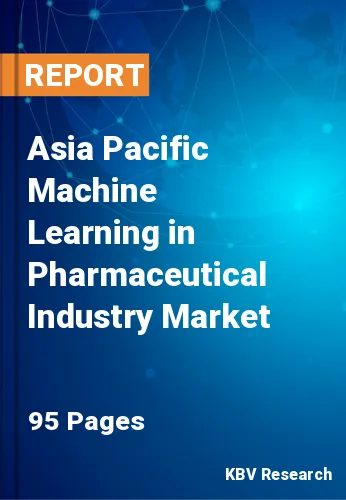The Asia Pacific Machine Learning in Pharmaceutical Industry Market would witness market growth of 35.7% CAGR during the forecast period (2023-2029).
The pharmaceutical sector is using machine learning more and more to evaluate healthcare data for a range of purposes, such as drug development, clinical trials, and personalized treatment. Clinical trials, electronic health records, and medical claims are just a few sources of the enormous data the pharmaceutical industry produces. Machine learning can be used to anticipate potential safety issues and identify negative drug interactions before they happen. In addition, machine learning algorithms can find patterns in vast amounts of data from social media, electronic health records, and other sources that may not be obvious to human analysts.
Over the following years, there will be an increase in applications for micro biosensors and equipment, as well as mobile apps with more advanced health measurement and remote monitoring capabilities, which will result in an additional flood of data that can be used to support R&D and treatment efficacy. In addition to optimizing an individual's health, this kind of tailored care also has significant financial benefits for the healthcare system as a whole. For instance, healthcare expenses will decrease if more patients follow their doctors' orders and adhere to treatment regimens.
Japan is using more data and ICT in the health, medical, and nursing care industries so that every citizen can get help with their health. According to Japan's Ministry of Health and Welfare, the eHealth industry is growing because more doctors are using the internet, and more people are looking up basic information about hospitals online before going there. The adoption of machine learning in the pharmaceutical industry is expected to increase due to the digitalization of healthcare, which aims to provide healthcare facilities to all. This trend is driven by various factors, including the need to reduce healthcare costs, and is expected to create growth opportunities for the market in the region.
The China market dominated the Asia Pacific Machine Learning in Pharmaceutical Industry Market by Country in 2022, and would continue to be a dominant market till 2029; thereby, achieving a market value of $839.2 million by 2029. The Japan market is estimated to grow a CAGR of 34.9% during (2023 - 2029). Additionally, The India market would experience a CAGR of 36.5% during (2023 - 2029).
Based on Component, the market is segmented into Solution and Services. Based on Deployment Mode, the market is segmented into Cloud and On-premise. Based on Organization size, the market is segmented into Large Enterprises and SMEs. Based on countries, the market is segmented into China, Japan, India, South Korea, Singapore, Malaysia, and Rest of Asia Pacific.
Free Valuable Insights: The Worldwide Machine Learning in Pharmaceutical Industry Market is Projected to reach USD 11.4 Billion by 2029, at a CAGR of 34.4%
The market research report covers the analysis of key stake holders of the market. Key companies profiled in the report include Google LLC (Alphabet, Inc.), NVIDIA Corporation, IBM Corporation, Microsoft Corporation, Cyclica, Inc., BioSymetrics Inc., Cloud Pharmaceuticals, Inc., Deep Genomics Incorporated and Atomwise, Inc.
By Component
By Deployment Mode
By Organization size
By Country
Our team of dedicated experts can provide you with attractive expansion opportunities for your business.

